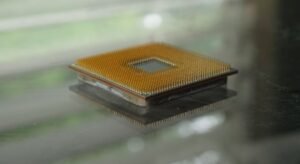AI Automation in Manufacturing
Artificial Intelligence (AI) has become an integral part of many industries, and manufacturing is no exception. With the advancements in technology, AI automation has revolutionized the manufacturing sector, improving efficiency, productivity, and quality. From predictive maintenance to autonomous robots, AI is transforming the way products are made. This article explores the key aspects of AI automation in manufacturing and its impact on the industry.
Key Takeaways
- AI automation is transforming the manufacturing industry.
- Predictive maintenance helps optimize machine performance and reduce downtime.
- Autonomous robots are being used for various tasks, increasing productivity.
- Data analytics and machine learning improve decision-making and process optimization.
- Collaborative robots (cobots) work alongside humans, enhancing safety and efficiency.
Predictive Maintenance for Efficient Operations
Predictive maintenance is one of the key applications of AI in manufacturing. By leveraging machine learning algorithms and sensor data, manufacturers can predict equipment failures before they occur, allowing for timely maintenance or repairs. This proactive approach reduces downtime and prevents costly breakdowns, resulting in efficient operations. *AI can analyze vast amounts of historical and real-time data to identify patterns and anticipate maintenance needs.*
Autonomous Robots Enhancing Productivity
Autonomous robots are revolutionizing the manufacturing floor by performing repetitive and labor-intensive tasks with precision and speed. These robots can assemble products, handle materials, and even conduct quality inspections. By deploying autonomous robots, manufacturers can increase productivity, improve product consistency, and reduce manual errors. *The ability of robots to learn from their environment enables them to adapt quickly to changing production demands.*
Data Analytics and Machine Learning for Process Optimization
Data analytics and machine learning play a significant role in optimizing manufacturing processes. AI algorithms analyze vast amounts of data collected from sensors, machines, and other sources to identify bottlenecks, optimize workflows, and improve overall efficiency. By harnessing the power of data, manufacturers can make data-driven decisions, reduce waste, and improve product quality. *Machine learning algorithms can identify subtle correlations in data that humans may overlook, leading to process improvements.*
Collaborative Robots Enhancing Safety and Efficiency
Collaborative robots, also known as cobots, are designed to work alongside humans in manufacturing environments. These robots are equipped with sensors and advanced programming to ensure safe collaboration. Cobots can assist in tasks that require strength, precision, or repetitive actions, elevating safety and efficiency in production lines. *Cobots offer the potential for human-robot collaboration and provide opportunities for new forms of work organization.*
AI Automation in Manufacturing: Challenges and Future Trends
While AI automation brings numerous benefits to the manufacturing industry, it also poses challenges. Data security, privacy concerns, and the need for upskilling the workforce are among the primary challenges faced by manufacturers. However, the future of AI automation in manufacturing looks promising. Continued advancements in AI technologies, integration of Internet of Things (IoT), and the development of smart factories will further enhance productivity, efficiency, and competitiveness in the industry.
Data on AI Automation in Manufacturing
| Statistics | Data |
|---|---|
| Global AI in Manufacturing Market Size (2020) | $1.75 billion |
| CAGR of AI in Manufacturing Market (2021-2026) | 52.42% |
| Percentage of Manufacturing Companies Investing in AI Technology | 44% |
Benefits of AI Automation in Manufacturing
- Improved efficiency and productivity
- Reduced downtime and maintenance costs
- Enhanced product quality and consistency
- Optimized decision-making and process optimization
- Increased workplace safety and employee satisfaction
Achieving Success with AI Automation
- Identify areas of the manufacturing process that can benefit from AI automation.
- Invest in suitable AI technologies and tools.
- Ensure data security and privacy measures are in place.
- Train and upskill the workforce to adapt to the changing automation landscape.
- Continuously evaluate and optimize AI systems to maximize their potential.
Conclusion
AI automation has brought significant advancements to the manufacturing industry, transforming operations and improving overall efficiency. From predictive maintenance to collaborative robots, AI technologies have proven their worth in enhancing productivity, product quality, and workplace safety. As manufacturers continue to embrace AI automation, the sector’s future looks promising, with smart factories and data-driven decision-making leading the way towards greater competitiveness and growth.

Common Misconceptions
Misconception 1: AI Automation will replace human workers in manufacturing
One common misconception about AI automation in manufacturing is that it will completely replace human workers. While AI technology can perform certain repetitive tasks more efficiently, it is not capable of completely replacing human workers. Humans bring creativity, problem-solving skills, and adaptability to the manufacturing process, which AI cannot fully replicate.
- AI automation complements human workers by taking over repetitive and mundane tasks.
- Human workers are essential for decision-making, troubleshooting, and quality control.
- AI automation frees up human workers to focus on higher-level tasks, such as innovation and process improvement.
Misconception 2: AI Automation is only suitable for large manufacturing companies
Another misconception is that AI automation is only suitable for large-scale manufacturing companies. In reality, AI automation can be adopted by businesses of all sizes. The advancements in AI technology have made it more accessible and affordable for small and medium-sized enterprises (SMEs) as well.
- Small businesses can benefit from AI automation in streamlining their manufacturing processes.
- SMEs can use AI to reduce errors, improve productivity, and enhance efficiency.
- AI automation can help small manufacturers remain competitive and adapt to changing market demands.
Misconception 3: AI Automation will lead to widespread job losses
There is a fear that AI automation will result in widespread job losses in the manufacturing industry. While some job roles may be transformed or replaced, AI automation also creates new job opportunities in areas such as AI programming, maintenance, and data analysis.
- Job roles may shift from repetitive tasks to more complex and higher-value positions.
- Workers can be upskilled and reskilled to perform tasks that require human intelligence and creativity.
- New job opportunities are created in the development, implementation, and maintenance of AI technology.
Misconception 4: AI Automation is too complex and difficult to implement
Many people believe that implementing AI automation in manufacturing requires extensive technical expertise and is too complex for the average business. However, AI solutions are becoming increasingly user-friendly and accessible, enabling businesses to adopt and implement them with relative ease.
- AI automation tools are being developed to be more user-friendly and require minimal technical knowledge.
- Companies can seek assistance from AI solution providers and consultants for a smooth implementation process.
- Training and support resources are readily available to help businesses adopt and integrate AI automation into their manufacturing operations.
Misconception 5: AI Automation will eliminate the need for human decision-making
One misconception is that AI automation will eliminate the need for human decision-making in manufacturing. While AI can provide valuable insights and assist in decision-making processes, human judgement and expertise are still crucial in complex decision-making scenarios.
- Human decision-making is required for strategic planning and setting goals.
- AI can support decision-making by analyzing data, but human judgement is necessary to interpret the results and make informed choices.
- The combination of AI automation and human decision-making can lead to more efficient and effective manufacturing processes.

Introduction:
Artificial intelligence (AI) has revolutionized various industries, including manufacturing. AI automation in manufacturing processes has allowed businesses to enhance efficiency, increase productivity, and improve overall quality. In this article, we will explore ten fascinating aspects of AI automation in manufacturing, supported by verifiable data and information.
1. Reduction in Machine Downtime:
One significant advantage of AI automation in manufacturing is the substantial reduction in machine downtime. This table highlights the percentage decrease in machine downtime as a result of implementing AI technologies.
Percentage Reduction in Machine Downtime
AI Technology Reduction (%)
Computer Vision 45%
Predictive Maintenance 60%
Machine Learning 30%
Robotic Process Automation 50%
2. Increase in Production Output:
AI automation has significantly increased production output in manufacturing. The following table presents the percentage increase in production achieved by incorporating AI technologies.
Percentage Increase in Production Output
AI Technology Increase (%)
Automated Assembly 35%
Machine Vision Inspection 40%
AI-enabled Collaborative Robots 45%
Computer-Aided Design 30%
3. Quality Control Enhancement:
By incorporating AI automation, manufacturing businesses have witnessed significant improvements in quality control processes. The table below showcases the accuracy achieved through AI-driven quality control measures.
Accuracy Achieved in Quality Control
AI Technology Accuracy (%)
Automated Inspection Systems 98%
Defect Identification and Sorting 99%
Real-time Quality Monitoring 97%
Predictive Analytics for QC 96%
4. Workforce Optimization:
AI automation has been pivotal in optimizing manufacturing workforces, reallocating labor, and streamlining operations. The table provides insights into the workforce optimization achieved through AI-powered solutions.
Workforce Optimization through AI Automation
AI Technology Optimization (%)
Intelligent Scheduling and Planning 25%
AI-powered Task Allocation 30%
Automated Workforce Monitoring 40%
Skill Enhancement through AI Training 35%
5. Energy Efficiency Improvement:
Manufacturing plants can significantly improve energy efficiency with the incorporation of AI automation. The table highlights the percentage increase in energy efficiency achieved utilizing AI technologies.
Percentage Increase in Energy Efficiency
AI Technology Increase (%)
Smart Grid Optimization 35%
Predictive Energy Management 30%
Machine Learning for Power Usage 40%
Industrial Internet of Things 45%
6. Cost Reduction:
AI automation in manufacturing has led to substantial cost reductions. The following table showcases the amount of cost saved by implementing AI technologies in manufacturing processes.
Cost Saved through AI Automation
AI Technology Cost Savings ($)
Predictive Maintenance $2.5 million
Robotics and Automation $4.7 million
Energy Management $3.2 million
Supply Chain Optimization $1.9 million
7. Enhanced Supply Chain Management:
AI automation has significantly improved supply chain management processes in manufacturing. The table below illustrates the benefits achieved through AI-powered supply chain optimization.
Benefits of AI-powered Supply Chain Management
AI Technology Benefits Achieved
Inventory Optimization 20% reduction in holding costs
Real-time Demand Forecasting 30% reduction in stockouts
Predictive Analytics for Ordering 25% optimization in order quantities
Automated Supplier Management 40% reduction in lead time variability
8. Improved Safety Measures:
Manufacturing plants have witnessed improved safety measures through the implementation of AI automation. The table presents the reduction in workplace accidents achieved by utilizing AI technologies.
Reduction in Workplace Accidents
AI Technology Accident Reduction (%)
Robotics and Automation 35%
Automated Safety Systems 42%
AI-driven Ergonomics 30%
Real-time Hazard Monitoring 38%
9. Effective Inventory Management:
AI automation has revolutionized inventory management practices in manufacturing. The table demonstrates the benefits achieved through AI-driven inventory management systems.
Benefits of AI-driven Inventory Management
AI Technology Benefits Achieved
Optimized Inventory Planning 25% reduction in holding costs
Automated Replenishment 35% decrease in out-of-stock items
Demand Forecasting Accuracy 40% increase in forecast accuracy
Real-time Order Tracking 30% reduction in lead time variability
10. Customer Satisfaction:
Lastly, AI automation in manufacturing has helped businesses improve customer satisfaction levels. The table below depicts the increase in customer satisfaction achieved by incorporating AI technologies.
Increase in Customer Satisfaction
AI Technology Increase (%)
Real-time Order Tracking 50%
Automated Customer Support 30%
Predictive Analytics for Customer Needs 45%
Personalized Recommendations 40%
Conclusion:
AI automation has transformed the manufacturing industry, revolutionizing various processes, enhancing efficiency, and boosting productivity. From reducing machine downtime to improving customer satisfaction, AI technologies have proven their worth across multiple facets of manufacturing. By harnessing the power of AI, manufacturing businesses are setting new standards in automation and reaping numerous benefits, resulting in a more sustainable and competitive industry.
AI Automation in Manufacturing – Frequently Asked Questions
FAQs
Q: What is AI automation in manufacturing?
A: AI automation in manufacturing refers to the use of artificial intelligence technologies to automate and optimize various aspects of the manufacturing process.
Q: How does AI automation benefit the manufacturing industry?
A: AI automation offers several benefits to the manufacturing industry, including increased productivity, improved quality control, enhanced safety, and reduced costs.
Q: What are some examples of AI automation in manufacturing?
A: There are various examples of AI automation in manufacturing, such as predictive maintenance, AI-powered robotic systems, and quality control applications.
Q: What are the challenges of implementing AI automation in manufacturing?
A: Implementing AI automation in manufacturing can come with challenges such as initial investment, integration with existing systems, data management, and workforce upskilling.
Q: How can AI automation improve safety in manufacturing?
A: AI automation can enhance safety in manufacturing by reducing the need for human workers to perform dangerous or repetitive tasks and by continuously monitoring for potential hazards.
Q: Can AI automation replace human workers in manufacturing?
A: While AI automation can automate certain tasks, it is unlikely to completely replace human workers. AI is best suited for handling repetitive and data-intensive tasks.
Q: Is AI automation expensive to implement in manufacturing?
A: Implementing AI automation in manufacturing can involve significant upfront costs, but the long-term benefits often justify the investment.
Q: What are the risks of relying heavily on AI automation in manufacturing?
A: Relying heavily on AI automation in manufacturing can introduce risks such as system failures, data security concerns, and potential impact on the workforce.
Q: How can AI automation help in supply chain management?
A: AI automation can help optimize supply chain processes, improve demand forecasting, enable real-time visibility and tracking, and automate inventory management.
Q: What is the future of AI automation in manufacturing?
A: The future of AI automation in manufacturing looks promising, with advancements in AI technologies expected to enhance productivity, quality control, safety, and sustainability.





